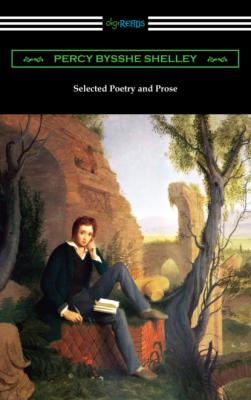Selected Poetry and Prose. Percy Bysshe Shelley
Чтение книги онлайн.
Читать онлайн книгу Selected Poetry and Prose - Percy Bysshe Shelley страница 14
 the fierce fiend of a distempered dream,
the fierce fiend of a distempered dream,
And shook him from his rest, and led him forth
Into the darkness. As an eagle, grasped
In folds of the green serpent, feels her breast
Burn with the poison, and precipitates
Through night and day, tempest, and calm, and cloud,
Frantic with dizzying anguish, her blind flight
O’er the wide aëry wilderness: thus driven
By the bright shadow of that lovely dream,
Beneath the cold glare of the desolate night,
Through tangled swamps and deep precipitous dells,
Startling with careless step the moon-light snake,
He fled. Red morning dawned upon his flight,
Shedding the mockery of its vital hues
Upon his cheek of death. He wandered on
Till vast Aornos seen from Petra’s steep
Hung o’er the low horizon like a cloud;
Through Balk, and where the desolated tombs
Of Parthian kings scatter to every wind
Their wasting dust, wildly he wandered on,
Day after day, a weary waste of hours,
Bearing within his life the brooding care
That ever fed on its decaying flame.
And now his limbs were lean; his scattered hair,
Sered by the autumn of strange suffering,
Sung dirges in the wind; his listless hand
Hung like dead bone within its withered skin;
Life, and the lustre that consumed it, shone,
As in a furnace burning secretly,
From his dark eyes alone. The cottagers,
Who ministered with human charity
His human wants, beheld with wondering awe
Their fleeting visitant. The mountaineer,
Encountering on some dizzy precipice
That spectral form, deemed that the Spirit of Wind,
With lightning eyes, and eager breath, and feet
Disturbing not the drifted snow, had paused
In its career; the infant would conceal
His troubled visage in his mother’s robe
In terror at the glare of those wild eyes,
To remember their strange light in many a dream
Of after times; but youthful maidens, taught
By nature, would interpret half the woe
That wasted him, would call him with false names
Brother and friend, would press his pallid hand
At parting, and watch, dim through tears, the path
Of his departure from their father’s door.
At length upon the lone Chorasmian shore
He paused, a wide and melancholy waste
Of putrid marshes. A strong impulse urged
His steps to the sea-shore. A swan was there,
Beside a sluggish stream among the reeds.
It rose as he approached, and, with strong wings
Scaling the upward sky, bent its bright course
High over the immeasurable main.
His eyes pursued its flight:—‘Thou hast a home,
Beautiful bird! thou voyagest to thine home,
Where thy sweet mate will twine her downy neck
With thine, and welcome thy return with eyes
Bright in the lustre of their own fond joy.
And what am I that I should linger here,
With voice far sweeter than thy dying notes,
Spirit more vast than thine, frame more attuned
To beauty, wasting these surpassing powers
In the deaf air, to the blind earth, and heaven
That echoes not my thoughts?’ A gloomy smile
Of desperate hope wrinkled his quivering lips.
For sleep, he knew, kept most relentlessly
Its precious charge, and silent death exposed,
Faithless perhaps as sleep, a shadowy lure,
With doubtful smile mocking its own strange charms.
Startled by his own thoughts, he looked around.
There was no fair fiend near him, not a sight
Or sound of awe but in his own deep mind.
A little shallop floating near the shore
Caught the impatient wandering of his gaze.
It had been long abandoned, for its sides
Gaped wide with many a rift, and its frail joints
Swayed with the undulations of the tide.
A restless impulse urged him to embark
And meet lone Death on the drear ocean’s waste;
For well he knew that mighty Shadow loves
The slimy caverns of the populous deep.
The day was fair and sunny; sea and sky
Drank its inspiring radiance, and the wind
Swept strongly from the shore, blackening the waves.
Following his eager soul, the